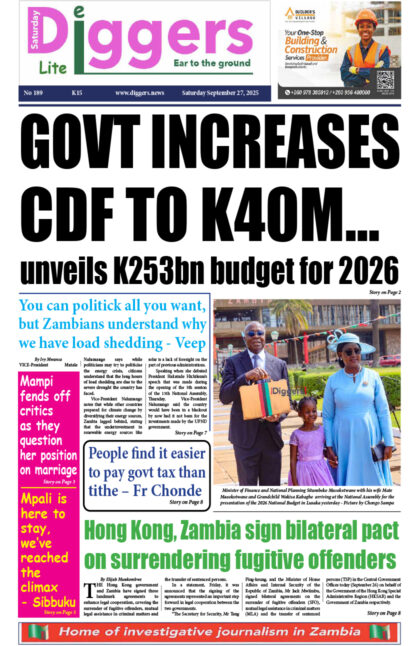MAZABUKA Central UPND member of parliament Gary Nkombo and former Roan PF member of parliament Chishimba Kambwili have argued that a motion to impeach President Edgar Lungu is a privilege of the National Assembly and that the Judiciary cannot determine it.
The two have therefore, asked the Lusaka High Court to dismiss an application for Judicial Review proceedings by two citizens who are challenging the Speaker’s decision to table the motion, and to allow it to be considered in Parliament.
This is a matter in which two Lusaka residents Robert Chabinga and Henry Mulenga are challenging the Speaker’s decision to table in Parliament, the motion to impeach President Lungu.
Chabinga and Mulenga as first and second applicants respectively, argued that it is unreasonable, procedurally improper and illegal for the Speaker to consider tabling the impeachment motion in Parliament.
They cited the Attorney General as respondent while Nkombo and Kambwili joined the matter as respondents following the Court of Appeal’s order to have them joined to the Judicial Review Proceedings as parties that were properly interested in the same.
On March 22, 2018, Kambwili and Nkombo moved a motion in the National Assembly for the impeachment of President Edgar Lungu.
Upon receiving the motion, the Speaker on March 28, 2018 approved the tabling of the motion and guided that it would be tabled and considered by the National Assembly at a given date in June, 2018.
Consequently, Chabinga and Mulenga launched Judicial Review proceedings on April 3, 2018 before the Lusaka High Court.
But in an affidavit in opposition to the application for judicial review filed in the Lusaka High Court recently, Nkombo argued that the motion for impeachment was properly before the National Assembly for determination of all the grounds as parliamentary procedure was followed in tabling the motion.
He added that the applicants were complete strangers to the parliamentary procedures comprised in the process.
“The process of impeachment of the President of the Republic of Zambia is a privilege of the National Assembly of Zambia. The applicants are complete strangers to the parliamentary procedures comprised in the impeachment process, it being one preserved for the National Assembly and its members,” Nkombo stated.
He further stated that the ConCourt did not determine the substantive questions in issue in the Presidential Election petition and in the case relating to the eligibility of the President to stand as presidential candidate in 2021, on their merits.
Nkombo submitted that the core of the Judicial Review proceedings was to have the decision of the Speaker to entertain the motion declared null and void and quashed because the motion contained grounds that were subject of proceedings that were pending before the Constitutional Court [being the eligibility case and the Presidential election petition] which have since been determined by the courts of law.
“There are currently no issues pending determination before the courts under the impeachment process pending before the National Assembly which is the subject matter of the Judicial Review proceedings before this court. In the premise, it is fit and proper for this court to dismiss the Judicial Review Proceedings before it,” he submitted.
Nkombo stated that there would be no prejudice that would be occasioned on the applicants by such dismissal.
And in Nkombo and Kambwili’s skeleton arguments in opposition to the application for judicial review, the two argued that the procedures of the National Assembly could not be determined by another arm of Government and that the Judiciary could not determine a motion which was properly before the National Assembly.
“It is our submission that the provisions of Article 108 of the Constitution make it clear that a motion for impeachment of the Republic President is a privilege preserved for the National Assembly. To this end, a member of the public who is not a member of the National Assembly has no standing in such a matter,” they stated.
They submitted that the grounds for impeachment motion were still valid and warranted the motion to be determined by the National Assembly.
Nkombo and Kambwili argued that the Speaker did not act unreasonably when he approved the tabling of the motion because the process of impeachment as provided under Article 108 of the Constitution was the preserve of the National Assembly.
“All in all it is our submission that the proceedings are not properly before this court as they have been overtaken by events. Consequently, the Judicial Review must be dismissed and the impeachment motion must be allowed to be considered in the National Assembly,” stated Nkombo and Kambwili.
























